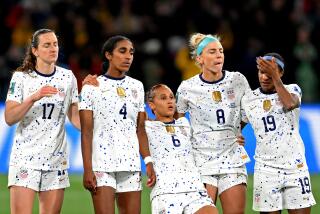WORLD CUP USA 1994 : COMMENTARY : Not Much Consolation in Third
Unleashing the offensive firepower they save for special occasions such as this, Sweden routed Bulgaria, 4-0, Saturday in the biggest explosion of goals in a World Cup third-place game since. . . .
Well, let’s see.
The World Encyclopedia of Soccer doesn’t list final scores from World Cup third-place games.
Neither does this massive manual on World Cup soccer entitled, well, “World Cup Soccer.”
Semifinal scores, yes.
Championship final scores, of course.
Third-place scores?
Hey, serious soccer historians can’t be bothered with such minutiae. Besides, the book deal called for 430 pages and not one page more. It was tough enough squeezing in the stuff about Zagalo, Zico and Dino Zoff.
Third-place games are the Michael Bolton music videos of the World Cup. Seen today, forgotten tomorrow. Millions of people claim to have had midfield-line seats for the 1986 World Cup final between Argentina and West Germany, but no one admits to being anywhere near the third-place game.
Exhaustive research shows that France and Belgium played in that one. Played overtime, even--the ultimate in windmill tilting.
After 120 minutes of purely scintillating soccer--or absolutely dreadful soccer; no one seems to know for sure--France won, 4-2.
Parisians still rave about the wine-addled ticker-tape parade down the Champs Elysees.
Italy played in the 1990 third-place game. In Italy, the Italians won, 2-1, over England, and were hooted and jeered off the field.
For a sport so thoroughly obsessed with first place or nothing--just ask Carlos Alberto Parreira, Brazil’s beleaguered coach--a match to decide who finishes third and who finishes fourth seems outlandishly frivolous.
Unless, of course, you happen to work for international soccer’s governing body, FIFA.
FIFA turned the stiles nearly 84,000 more times for Saturday’s Sweden-Bulgaria game. That buys a lot of bronze medals.
So many, in fact, that both winners and losers received them. Same medal, same metal.
And they received them before the first ball was kicked.
“The players were given their medals before the game,” said Bulgaria Coach Dimitar Penev, who counts himself among the third-place game resistance movement. “Because of this, this is how they play. Four goals in 15 minutes.”
Bulgaria had yielded four goals in its last 480 World Cup minutes. But then, the World Cup was still the dream of every Bulgarian during every one of those minutes.
Saturday, the point couldn’t be more moot.
“I think this game is not proper,” Penev said. “It should not be. There are too many games to play in too short a time. There’s too much stress.”
Even Thomas Ravelli, the Swedish goalkeeper who called placing third in the World Cup “the greatest moment in my football career,” paused to think when asked if the third-place game ought to be abolished.
“It’s hard to say,” Ravelli replied. “I mean, I think the Bulgarian team had a much harder match against Italy than our match with Brazil. And they had to play in New York, so they had jet lag and one less day to rest.
“It was very hard for them to play today. Bulgaria was not prepared for this game.”
And now, the Bulgarians face the prospect of a 9,500-mile flight home. That’s 3,000 more than it would have been had they left from New York in the first place, instead of from LAX in fourth place.
On the other hand, the Bulgarians were able to put off the trip back to Bulgaria for three more days, so maybe the third-place game in the World Cup is a wonderful concept that ought to be chiseled in marble.
Poolside room service, Hristo. What a country.
They packaged the third-place game with the final, put them both inside the Rose Bowl and billed them as equal halves of the “Soccerfest” weekend extravaganza.
Was anybody buying it?
Well, Swedish striker Kennet Andersson, third-place medalist, was lobbying hard to press onward.
“Sure,” he said. “Now we know that Sweden is third in the world and Bulgaria is fourth. We need this game to show we are better than Bulgaria.”
Good to have that taken care of.






